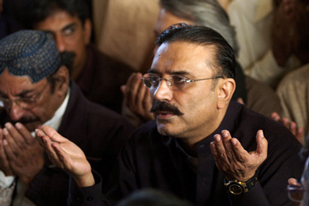Profile: Asif Ali Zardari
PPP leader has faced up to 18 corruption and criminal charges, none proven in court.

 |
|
Zardari, co-chair of the PPP, spent a total of |
As co-chairman of the Pakistan People’s Party (PPP), Asif Ali Zardari is no stranger to political scandals and corruption charges.
Widower of the late former Pakistani prime minister, Benazir Bhutto, Zardari served as a member of the national assembly and as an environment minister during his wife’s second term of premiership.
His position in government as a senator ended in 1999 when the senate and assemblies were disbanded by Pervez Musharraf, then former army chief, in a coup over the government.
After the assignation of Bhutto on December 27, 2007, Zardari was selected to co-chair the PPP with his son, Bilawal Bhutto Zardari, which was an anticipated move.
After spending three years in prison, Zardari was released in 1993 after charges of blackmail were dropped.
Extortion charge
In 1990, Zardari was accused of attaching a bomb on Murtaza Bukhari, a Pakistani business man, and forcing him to withdraw money from his bank account.
He was then later arrested in 1996 on murder charges after his late wife’s brother-in-law, Murtaza Bhutto, was assassinated.
Zardari was held in custody from 1997 to 2004 on corruption and murder charges.
| Asif Ali Zardari: |
|
Born on July 21, 1956 to Pakistani industrialist Hakim Ali Zardari, chief of the Zardari tribe. Married Benazir Bhutto, daughter of late ex-PM Zulfiqar Ali Bhutto on December 18, 1987. Had three children with Bhutto: Bilawal, Bakhtwar and Asifa. Serves as a co-chairman, with his son Bilawal, of the Pakistan People’s Party. |
A judge later granted Zardari bail and released him in November 2004, sayingthe cases against him were false.
Prison time did not stop there for Zardari, as he was arrested again in December 2004 for his failure to attend a hearing in a murder trial in Karachi.
Zardari was convicted of different charges, but evidence of conversations on audiotapes between the judge and some top aides of Nawaz Sharif, then prime minister, proved the judge was put under pressure to convict him.
After spending a total of 11 years in prison – for politically motivated accusations, according to him – Zardari still faces money-laundering charges.
The money-laundering charges were made against both him and Bhutto. Those against Bhutto were dropped after her death in December last year; the proceedings against Zardari are continuing.
Zardari is a resident of New York and owns homes in Dubai and London. He lived in the three cities before returning to Pakistan with Bhutto last October in preparation for the national election.
Zardari underwent medical treatment in 2004 in the US.
He suffers from diabetes, a spinal ailment and heart trouble.